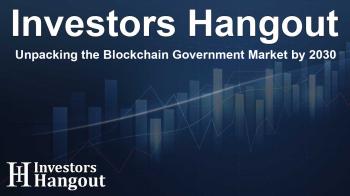Unpacking the Blockchain Government Market by 2030

The Expanding Blockchain Government Market
The global Blockchain Government market is undergoing a transformative phase. Recent evaluations suggest the market's worth at approximately US$22.5 billion, with a remarkable projection to soar to US$791.5 billion by 2030, reflecting a stunning CAGR of 81% during this period. This extensive analysis offers insights into emerging patterns, key influences, and forecasts that are critical for informed decision-making in this vibrant sector.
Key Growth Drivers
The growth in the Blockchain Government space stems from various pivotal factors. A significant demand for transparency and secure data management is driving the urgency for digital solutions in public administration, where the need for secure digital identity systems has intensified. Governments worldwide are increasingly pressured to enhance citizen data security in the face of escalating cyber threats. Blockchain's decentralized architecture is considered a prime candidate for modernizing and fortifying digital identity management, particularly as public services evolve.
Demand for Transparency and Accountability
Another catalyst for growth is the heightened need for accountability in government expenditures, contracting, and electoral processes. The adoption of blockchain technology allows for the establishment of tamper-proof records, which enhances the credibility of public services. As the digital transformation reshapes how governments and citizens interact, blockchain solutions are becoming essential to streamline operations and foster trust.
Impact of E-Government Initiatives
The transition towards e-government and advancing digital transformation initiatives further accelerates blockchain integration, with aims to optimize service delivery and improve citizen engagement. By automating administrative processes like taxation and welfare provision through blockchain, governments can reduce operational costs and elevate service efficiency.
International Regulatory Support
Furthermore, adaptable regulatory frameworks and pilot programs in various regions encourage the exploration and implementation of blockchain technologies in the public sector. This supportive infrastructure is vital as governments recognize the capacity of blockchain to create secure, efficient, and transparent systems.
Understanding Regional Trends
Geographically, the Blockchain Government market is not uniform; it reflects diverse growth trajectories. Insights reveal that in the U.S., the market capitalization is expected to be around $7.5 billion, and in China, projections show a robust growth of about 74.9% CAGR to reach approximately $94 billion by 2030.
Key Regional Dynamics
Europe, especially countries like Germany and the United Kingdom, Canada, and Japan, also show significant growth patterns, each navigating unique demands and regulatory landscapes that shape their blockchain adoption paths.
The Competitive Landscape
In the realm of Blockchain Government applications, major players such as Accenture, AWS, Bitfury, and several others are at the forefront, providing innovative solutions and shaping market dynamics. The report detailing 289 major companies includes vital market data, expected sales forecasts, and the continued expansion of the sector.
Innovative Applications of Blockchain
Key applications within this sector encompass smart contracts, asset registry, identity management, and secure voting systems. These innovations not only enhance operational integrity but also promote efficient governance, ensuring that crucial public records are dependable and accessible.
Future Projections
The trajectory of the Blockchain Government market signifies that by 2030, there will be a noteworthy evolution in its structure and implementation. Notable increases in investments and technological advancements will encourage governments to fully utilize blockchain. More than just a trend, it represents a foundational shift in public administration, redefining how services are delivered to citizens.
Frequently Asked Questions
What is the current valuation of the Blockchain Government market?
The current valuation is approximately US$22.5 billion as of 2024.
What factors are contributing to the high CAGR of 81%?
The rapid advancements in technology, demand for transparency, and digital identity security are key contributors to the robust growth rate.
How does blockchain enhance voting systems?
Blockchain provides transparent, tamper-proof records that enhance trust in electoral processes.
What are the primary applications of blockchain in government?
Main applications include secure voting, identity management, smart contracts, and efficient asset registry.
What role do major companies play in this market?
Major companies drive innovation, offering solutions that enhance system security, efficiency, and public interaction.
About The Author
Contact Owen Jenkins privately here. Or send an email with ATTN: Owen Jenkins as the subject to contact@investorshangout.com.
About Investors Hangout
Investors Hangout is a leading online stock forum for financial discussion and learning, offering a wide range of free tools and resources. It draws in traders of all levels, who exchange market knowledge, investigate trading tactics, and keep an eye on industry developments in real time. Featuring financial articles, stock message boards, quotes, charts, company profiles, and live news updates. Through cooperative learning and a wealth of informational resources, it helps users from novices creating their first portfolios to experts honing their techniques. Join Investors Hangout today: https://investorshangout.com/
The content of this article is based on factual, publicly available information and does not represent legal, financial, or investment advice. Investors Hangout does not offer financial advice, and the author is not a licensed financial advisor. Consult a qualified advisor before making any financial or investment decisions based on this article. This article should not be considered advice to purchase, sell, or hold any securities or other investments. If any of the material provided here is inaccurate, please contact us for corrections.

